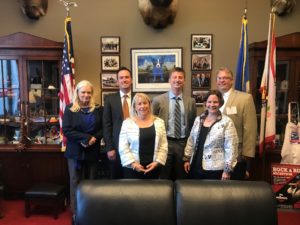MNA Delegation Rallies Support for Newsprint Tariff Relief
Minnesota Newspaper Association members were in Washington, D.C., last week urging lawmakers to intervene in a recent U.S. Department of Commerce decision they believe poses a serious threat to the future of not only newspapers across the state and nation, but to freedom of the press itself.
Photo: Back row- Randy Lebedoff-Star Tribune; Justin Lessman-Jackson County Pilot; Zach Martin-Legislative Assistant for Congressman Collin Peterson; Mike Dalton-Cannon Falls Beacon. Front row- Lisa Hills-MNA; Karin Ramige-McLeod County Chronicle, Glencoe
A group of Minnesota newspaper representatives met with members of the state’s congressional delegation and their staffers last Thursday in Washington as part of a coordinated effort by the D.C.-based News Media Alliance to rally support on Capitol Hill for a halt to recently imposed tariffs on Canadian newsprint.
Justin Lessman, publisher of the Jackson County Pilot and Lakefield Standard and a member of the MNA Board of Directors, said the new import tariffs — which have increased the cost of paper on which newspapers are printed by as much as 40 percent — jeopardize the viability of the newspaper industry and pose a direct threat to the First Amendment to the U.S. Constitution.
“Newspapers faced with significantly higher costs as a result of these unwanted tariffs are being forced to reduce pages dedicated to news, cut staff committed to gathering and reporting news and either raise subscription rates for paid-circulation newspapers or reduce distribution of free community newspapers — all of which impede community access to news and information,” Lessman said last week. “Newspapers are the only business enshrined in the U.S. Constitution, and these tariffs are posing a serious threat to their ability to exercise their constitutionally protected right.”
The tariffs are also having a wide-reaching economic effect. Open positions at some newspapers are going unfilled, while others are faced with cutting staff. Businesses that rely on newspapers for communication of their messaging may encounter diminished market penetration and higher advertising costs. Even farmers who supply soy ink for newspapers may feel the pain as demand softens. “This tariff could well have a devastating trickle-down effect on the state and national economy,” said MNA Vice President Karin Ramige, publisher of the McLeod County Chronicle and Arlington Enterprise.
Minnesota is served by around 320 newspapers, 238 of which have a circulation of less than 5,000 and 181 of which have a circulation of less than 2,500. MNA Executive Director Lisa Hills said some smaller community newspapers, which are already stressed by a decline in retail advertising and a soft ag economy, may have to make a tough choice in light of escalating newsprint costs — fight on with little hope of remaining financially viable, or simply cease to exist like so many other small businesses in rural Minnesota.
What’s especially frustrating, said MNA President Mike Dalton, publisher of the Canon Falls Beacon, is how the tariff came to be in the first place — as a result of a petition filed by a single paper mill in Washington state owned by a New York private equity firm. “On the basis of that one petition submitted by that one paper mill, in the absence of support by any other U.S. newsprint mill or associated trade group and without any opportunity for public comment or input, the U.S. Department of Commerce slapped these tariffs on Canadian newsprint — the only source of newsprint for many of America’s newspapers — and disrupted an entire industry,” he said. “This lone paper mill employs about 500 people. Its petition and subsequent action by the U.S. government have put literally hundreds of thousands of jobs in the newspaper, publishing and printing industries at risk. That just doesn’t seem right.”
Many lawmakers in Congress agree. Legislation has been introduced in the U.S. House and Senate that would suspend tariffs on Canadian newsprint and require the U.S. Department of Commerce to study the economic health of the printing and publishing industries and the potential economic effect a permanent tariff would have.
The Minnesota newspaper delegation traveled to Washington, D.C., last week to rally congressional support for the bill and ask lawmakers to testify at or submit comments in advance of a July 17 International Trade Commission hearing.

Photo: Gregg Jones- Executive Vice President Adams Publishing Group, Greenville, TN; Randy Lebedoff, Star Tribune; Karin Ramige-McLeod County Chronicle, Glencoe; Senator Amy Klobuchar; Lisa Hills – MNA; Mike Dalton-Cannon Falls Beacon Justin Lessman-Jackson County Pilot
U.S. Sen. Amy Klobuchar of Minnesota has agreed to co-sponsor the legislation in the Senate. “We are grateful to Sen. Klobuchar for stepping forward and showing leadership by signing on as a cosponsor of this bill,” said Randy Lebedoff, general counsel for the Star Tribune of Minneapolis. Other members of Minnesota’s congressional delegation are currently weighing the merits of intervening in the case. The U.S. Department of Commerce will issue a final determination in the case on Aug. 2. The ITC’s final determination is expected in mid-September.
Dalton encourages newspaper publishers, editors and other staffers — along with others involved in the printing and publishing industries and even community members who see value in their local newspapers — to contact their representatives in Congress and urge them to intervene, by signing on as a cosponsor of the Protecting Rational Incentives in Newsprint Trade Act of 2018 (H.R. 6031/S. 2385) and testifying at the July 17 ITC hearing or submitting comments ahead of time.
“Members of Congress from both sides of the aisle understand how essential a free press is to the well-being of our country and see how this unwanted tariff is posing a direct threat to that,” Dalton said. “This is truly a bipartisan issue and we see that represented in those members of Congress who have either signed on as cosponsors of the bill or who have agreed to testify or submit comments to the ITC. We applaud them for not only standing up for small businesses, jobs and economic prosperity, but also for standing up for the First Amendment, the U.S. Constitution and the future well-being of the country we all love.”

